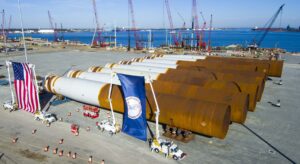
by Steve Haner
Two national activist groups on energy and environmental issues, both with connections to Virginia, have taken the first legal steps to challenge the recent federal approvals for Virginia’s planned offshore wind complex. Most of what follows is directly from their announcement dated November 14.
The Heartland Institute and the Committee for a Constructive Tomorrow (CFACT) are filing with the Bureau of Ocean Energy Management (BOEM) and the National Marine Fisheries Service (NMFS) a 60 Day Notice of Intent to Sue letter for a violation of the Endangered Species Act. The violation is contained in a defective “biological opinion,” which authorizes the construction of Dominion Energy Virginia’s Virginia Offshore Wind Project (VOW).
There have been two other important developments related to the wind project.
- Dominion has applied to the State Corporation Commission to increase the amounts its ratepayers will be contributing to the construction costs. For residential customers that is currently $4.74 for every 1,000 kilowatt hours of usage and Dominion want to increase it to $8.63 as of next summer. It is still not in compliance with the state law that gave an exemption from that charge to low income customers, claiming it lacks a list of such customers.
- Dominion’s principal turbine supplier, Europe’s Siemens Gamesa, has abandoned its plans to site a factory supporting the United States wind expansion in Portsmouth. That is a huge blow to Virginia’s dream of being an industry hub. (News was withheld by the state until after the election.) Both the company and many American projects are under huge financial pressure, as the press release on the possible lawsuit notes below. Today we learn German taxpayers may bail out Virginia’s ratepayers.
From Virginia to Germany, Danke Schoen.
The American Coalition for Ocean Protection, based in Delaware, worked with the other two groups earlier on reviewing and filing comments on Dominion’s applications, but is not a plaintiff in this action at this time. Neither is the Thomas Jefferson Institute for Public Policy, which has been affiliated with ACOP.
The 60 Day Notice is required by the Endangered Species Act (ESA) for parties who wish to commence litigation against BOEM for failure to provide adequate protection of the North Atlantic right whale and other endangered species. The North Atlantic right whale is listed as “critically endangered” by governments of both the Commonwealth of Virginia and the United States. Numerous studies by federal and environmental organizations have found that only about 350 North Atlantic right whales remain in existence.
CFACT and The Heartland Institute assert that the Biological Opinion issued by the NMFS fails to consider the cumulative impact of the entire East Coast offshore wind program ordered by the Biden administration and ignores the “best scientific information available” about the endangered population of the North Atlantic right whale.
The biological opinion found that the VOW would not cause a single death of that species of whale over its 30-year projected lifetime — although it did acknowledge the wind project could result in Level B harassment. That level could, according to NMFS, result in indirect death, requiring the need for a “take” permit, which authorizes the “harassment” and potential killing of the North Atlantic right whale.
The 60-day notice letter instructs the federal government agencies to take corrective action to remedy the alleged violations. If no corrective action is taken, the signatories of the letter are allowed to seek relief through the courts. The most likely venue for this litigation would be the U.S. District Court for the District of Columbia.
The firm of Gatzke, Dillon and Ballance has filed the letter as counsel for the CFACT and The Heartland Institute. The firm is currently representing plaintiffs in ongoing litigation against BOEM and NMFS, who are opposing construction offshore wind projects in Massachusetts, New Jersey, and New York.
Earlier this year, more than two dozen large dead whales washed up on the shores of New York, New Jersey, and Virginia, directly following 11 offshore sonar mapping activities conducted by wind developers. These “site characterization” studies use high-powered sonar pulses to determine the proper areas for placing the wind turbines. Sonar mapping has been found to interfere with the hearing capabilities of marine mammals. Environmental groups have successfully sued the Navy to restrict sonar mapping being conducted in the Pacific Ocean.
The 60-day notice adds to the risks faced by Dominion Energy as it attempts to build an offshore wind generation facility that would be the largest such project of its kind in the world. Siemens Energy, which has been designated by Dominion as the supplier of the huge 14MW turbines for the project, recently announced a write down of €2.4 billion for the 3rd quarter, leading to an annual loss of €4.5 Billion, due to costly mechanical failures in its new wind turbines. The company has said its turbine failures are a “quality issue” which “will take years to fix.”
Measured in megawatts, some 80 percent of the proposed East Coast wind projects have either been abandoned or are in the process of trying to renegotiate their power purchase agreements.
Missing from the news release, but important to remember, is that any cancellation (or for that matter major delay) of the project will not relieve Dominion’s ratepayers of their obligations to pay. As a regulated monopoly, with the project already blessed by the General Assembly and the state regulators, the utility is entitled to full cost recovery plus its 9.7% profit on capital.
Also worth remembering is a similar suit based on the threat to the whales in New England was dismissed. But if just one federal judge finds that BOEM and the fisheries agency erred, it could impact all the other projects.

Leave a Reply
You must be logged in to post a comment.